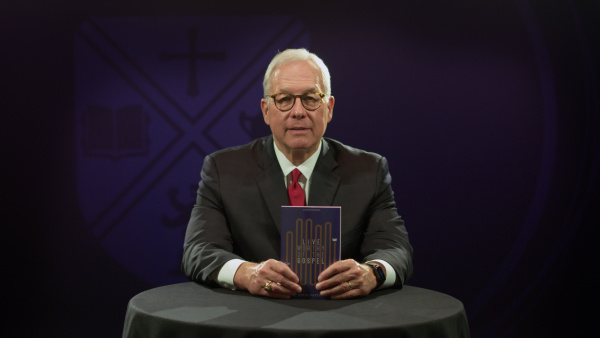PHILIPPIANS 1:27–30
Only let your conversation be as it becometh the gospel of Christ: that whether I come and see you, or else be absent, I may hear of your affairs, that ye stand fast in one spirit, with one mind striving together for the faith of the gospel; and in nothing terrified by your adversaries: which is to them an evident token of perdition, but to you of salvation, and that of God. For unto you it is given in the behalf of Christ, not only to believe on him, but also to suffer for his sake; having the same conflict which ye saw in me, and now hear to be in me.
After expressing his passionate prayer for their spiritual maturity (Phil. 1:3–11) and describing the advance of the Gospel through his imprisonment under Roman guard (1:12–26), Paul addresses the Philippians. What can they do to participate in the advance of the Gospel? He earnestly commands the Philippian believers to live worthy of the Gospel of Christ. We are responsible to obey that same command.
What is Paul’s Charge?
PHILIPPIANS 1:27
Only let your conversation be as it becometh the gospel of Christ.
WORD STUDY
Let your conversation be — to live out one’s citizenship
Becometh — worthily; fittingly; suitably
The phrase translated “let your conversation be” sounds like an exhortation concerning our speech. But conversation actually refers to how we live as citizens. At the heart of this term is the Greek word for city, polis. Paul appeals to his readers’ sense of citizenship because they were a privileged people. Unlike many in the Roman world, the Philippians enjoyed the distinction of Roman citizenship thanks to the conquest and colonization of Octavian (who later became Caesar Augustus). Their status in the Roman Empire entailed significant benefits, and they would have understood that with privilege comes responsibility.
So, Paul draws on their sense of civic duty to exhort them to live in a manner worthy of the Gospel. His premise is that believers are not only members of a political nation on earth: we are citizens of heaven (Phil. 3:20). He charges us to exercise our heavenly citizenship by properly reflecting what children of God are like and how they should live. We believe the Gospel is our identity, so we must live like it. And this gospel living is so important to Paul that he begins Philippians 1:27 with the word only. He has much to say in his letter to the Philippians, but his central focus is that we participate in the advance of Christ’s Gospel by living in a way that corresponds to our faith.
How Do We Live This Way?
PHILIPPIANS 1:27
. . . that whether I come and see you, or else be absent, I may hear of your affairs, that ye stand fast in one spirit, with one mind striving together for the faith of the gospel.
WORD STUDY
Stand fast — to stand firm; to persevere; to persist
Spirit — not the Holy Spirit but a man’s inner spirit; the soul
Mind — soul
With one mind — the group is united in heart about a matter
Striving together — to work together (side by side); to contend together; to labor with
Paul’s singular, consuming passion was to hear that the Philippians were living worthy of the Gospel whether or not he saw them again. He hoped to visit the Philippian church after his release from prison, but he knew the Roman government might execute him first. Either way, he wanted to hear that they were faithful, effective witnesses for Christ in their community. What directions does Paul give? What does faithful gospel living require?
First, the passage indicates that living worthy of the Gospel means taking a courageous stance. We have to “stand fast in one spirit” (1:27). The spirit could refer to the Holy Spirit but probably means a person’s inner being. Deep within each believer must be a commitment to pursue God’s purposes alongside other believers. Paul encourages us to be “in nothing terrified by (our) adversaries” (1:28). We cannot expect to live as citizens of heaven without encountering hostility from hell. That would be like living in Israel and assuming undisturbed peace with the Middle East. At the same time, we do not need to be fearful. We must simply trust God and take courage that “greater is he that is in (us), than he that is in the world” (1 John 4:4).
Second, living worthy of the Gospel means maintaining a united mindset. Participating in the advance of the Gospel requires a unified, cooperative effort of the entire congregation in personal and corporate evangelism. The Gospel cannot be believed if it is not first proclaimed (Rom. 10:13–15). The duty of the church is clear: if it doesn’t evangelize, it will inevitably fossilize! Those who spread the good news, however, must overcome the greatest barrier — paralyzing fear of rejection. Those who oppose the Gospel often intimidate the witnesses of Christ, resulting in the potential shutdown of evangelism.
Remaining united about “the faith of the gospel” is utterly crucial. An army that can sever the enemy forces in two has a much better chance of victory. A herd of gazelle in an African savannah are strong when together but vulnerable when separated. Christian unity in the Gospel is important for many reasons, not the least of which is the advance of the Gospel itself. “The faith” is core Christian belief centered on the Gospel. It has been handed down from one generation to the next for 2,000 years. Ensuring its continued advance hinges on a united, unwavering mindset. Good news that is not proclaimed ceases to be news. It’s still true. It’s still amazing. But no one hears about it.
What Motivates This Gospel-Centered Living?
PHILIPPIANS 1:28–30
And in nothing terrified by your adversaries: which is to them an evident token of perdition, but to you of salvation, and that of God. For unto you it is given in the behalf of Christ, not only to believe on him, but also to suffer for his sake; having the same conflict which ye saw in me, and now hear to be in me.
WORD STUDY
Terrified — to be frightened or intimidated; sometimes used in regard to spooking horses; may carry the idea of “throwing into consternation”
An evident token — sign (as in omen); proof
Perdition — destruction; waste; ruin; carries the idea of the utter ruin of those who do not believe
Given — graciously granted; bestowed
Suffer — to experience discomfort from an outside source; to be affected; to feel
Conflict — struggle; fight; battle; athletic metaphor referring to contesting for the Gospel
Paul gives two compelling reasons for us to be courageous and united in the face of our adversaries. First, opposition to the Gospel is a sure sign that the messengers are truly God’s people. “Blessed are they which are persecuted for righteousness’ sake: for theirs is the kingdom of heaven” (Matt. 5:10). Christians must take a courageous stance for the Gospel, but persecution is inevitable for all who choose to live godly in Christ Jesus (2 Tim. 3:12). While the destruction of God’s enemies is sure, our salvation is equally as secure (Phil. 1:28). Those who oppose the Gospel are proving that they are under conviction because of their sins. As they fight God’s work, their consciences cry out against them, making them aware that they are under divine judgment. Paul remembered the conviction he experienced prior to his conversion when he persecuted the church and stoned Stephen (Acts 7:58). Prior to his conversion, the Philippian jailer must also have experienced deep conviction because of his participation in the beating and imprisonment of Paul and Silas (Acts 16:23). God works in the hearts of those who fight against Him; therefore, believers never need to be intimidated.
Second, persecution introduced believers to a new spiritual dimension of grace. Paul compared the grace of suffering to the grace of salvation. Just as faith is a divine gift, freely given by a sovereign God, so suffering is a divine gift from the Lord. The Philippians face the same heroic struggle of standing for the Gospel in spite of persecution that Paul and Jesus had experienced. Those who stand for the Gospel experience “the fellowship of his sufferings” (Phil. 3:10). The Philippian believers were counted worthy to suffer with the apostle and with their Lord. We should never be intimidated by the world’s opposition to the Gospel, because “great is (our) reward in heaven” (Matt. 5:12). The Gospel by which Christ rescued us from death is a Gospel worth living for courageously and unitedly.
This post is from Live Worthy of the Gospel: A Study in Philippians by Steve Pettit. Copyright 2016 by BJU Press. Printed by permission of BJU Press.
This post is part of the study designed to correspond with the 2020 Fall Chapel Series. Watch the chapel message below:
Join us for chapel via live webcast at 11 a.m. every Monday and Wednesday.








